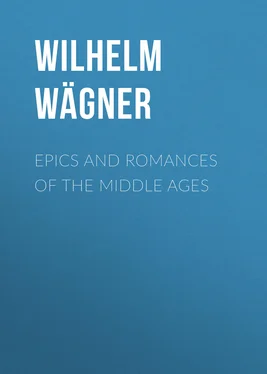The king, followed by six faithful attendants, made his way into the forest, and after riding a long time came in sight of a goodly grange. He entered, and found that the mistress of the house was his niece Hildeswid. He asked after Samson, but she said he was out. He then begged her to leave her husband and go with him; but she refused, advising him to go away as quickly as he could, lest he should fall into his enemy’s hands.
Brunstein confessed that she was right, and took his departure, but it was even then too late. Samson had returned, and, seeing them, at once set out in pursuit. No courage or strength, however great, could avail against his terrible arm. Brunstein and five of his warriors fell never to rise again, while the sixth got away with great difficulty and not without severe wounds. Samson started in pursuit. When he got out of the wood, he saw thirty horsemen galloping towards him. On their banner, a lion was displayed on a golden field.
“So, ho,” cried the hero, “you are Amelungs. Welcome, Uncle Dietmar. I rejoice to see you and your men.”
When they had rested and refreshed themselves in Samson’s grange, Dietmar explained, that having heard that his nephew was outlawed and in need of help, he had come to visit him and see whether he could be of any use. Samson was much pleased, and announced his intention of taking the open field now that he was no longer alone in the world. So he and his companions set out next morning. No one ventured to oppose him, and he soon had so large a district under his command that he was able to take up the powers and dignity of duke. After that he made his way towards Salern, and sent on messengers to desire the citizens to elect him king, under pain of having their town and possessions burnt about their ears.
After much conferring together, the burghers came to the conclusion that they could not do better than obey; for while Samson had been their friend, their town had been more flourishing than at any other time. So they sent to beg him to come and rule over them.
When the hero found that all was going as he wished, he sent for his wife, and, side by side, they rode into Salern, where they were received with acclamation.
The new ruler governed with a strong hand, and administered justice equally to all, both high and low. He showed a grateful remembrance of every kindness he had met with in his adversity, and kept peace on his borders. He grew old in the punctual fulfilment of these duties; and when he felt that he was no longer strong enough to do the work alone, he appointed his eldest son to be his assistant and successor. But he did not like it to be supposed that he was too old and weak to be of use; and so when his second son asked him what share he was to have in the royal heritage, he answered him nothing, but called together the whole army and made them an address.
He told them that when he was young every one had sought to do great deeds, but now people had grown lazy. The long peace, that had brought material blessing on the realm, had also brought the curse of a love of ease and pleasure; and for fear this evil should increase, and the country become an easy prey to some greedy neighbour, he summoned every warrior to appear before him in three months’ time, each accompanied by his men, and bearing a courageous heart within his breast, for he was going to lead them against a powerful foe.
The same day that Samson made this announcement to his army, he wrote a letter to the proud yarl Elsung of Bern (Verona), a man of about his own age, and with an equal love of great and heroic deeds. In this letter he demanded that Elsung should pay him tribute as his liege lord, and should give his daughter, Odilia, to his second son. All this he demanded as a right, due from a vassal to his king.
When the yarl read the letter, he was very angry, and made immediate preparations for war. He began by ordering five of Samson’s ambassadors to be hung on the spot, and the sixth to be sent back to his master with his tongue cut out.
No sooner were the three months over than King Samson started for Bern at the head of his men.
The armies met, and there was a great battle. The slaughter on either side was hideous. At length Samson’s wondrous strength enabled him to slay the yarl, and gain the victory. The Bernese, seeing that their ruler was dead, thought it most prudent to choose Samson for their king, and thus put an end to all ill-feeling between the two nations.
When this business was settled, the victor sent for the yarl’s daughter, Odilia, and told her that he intended her to be the wife of his second son, to whom he was going to make over her father’s realm. The maiden wept, and said that she could not marry so soon after her father’s death; but Samson’s rage at meeting with contradiction was so terrible, that the girl in mortal fear consented to wed the prince. His berserker wrath appeased by her obedience, the king at once regained his usual genial manner, kissed her, and assured her of his protection.
Конец ознакомительного фрагмента.
Текст предоставлен ООО «ЛитРес».
Прочитайте эту книгу целиком, купив полную легальную версию на ЛитРес.
Безопасно оплатить книгу можно банковской картой Visa, MasterCard, Maestro, со счета мобильного телефона, с платежного терминала, в салоне МТС или Связной, через PayPal, WebMoney, Яндекс.Деньги, QIWI Кошелек, бонусными картами или другим удобным Вам способом.
“Teutonic Mythology,” translated by J. S. Stallybrass. Vol. i. p. 315.










